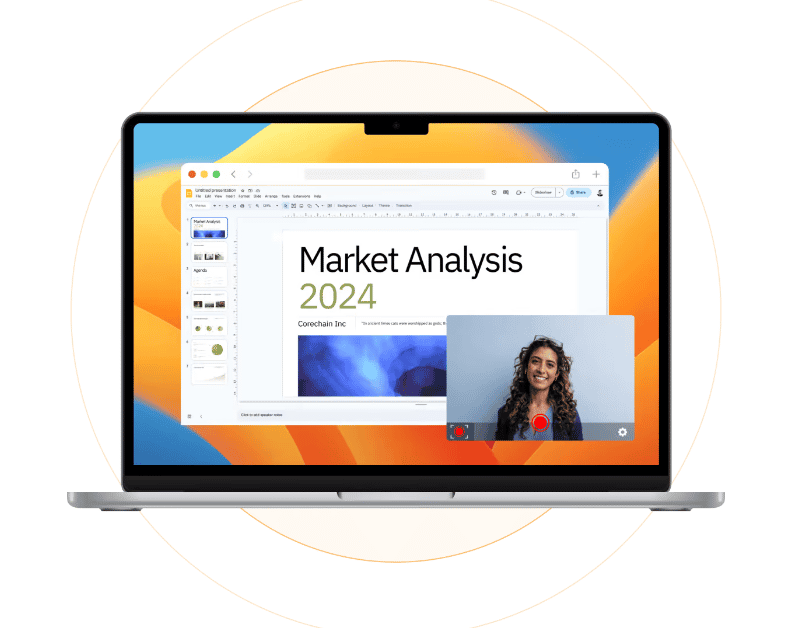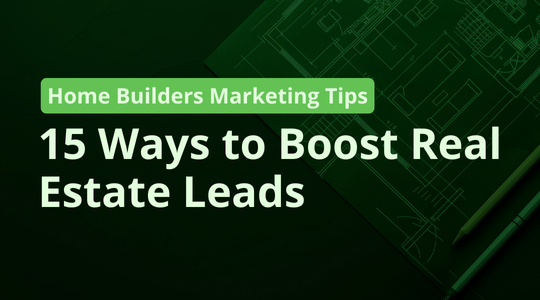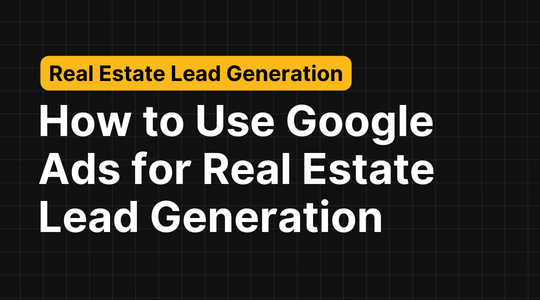Forget about door hangers and flyers.
The Internet is the most efficient, effective and reliable real estate lead generation tool. It provides the most comprehensive reach to potential real estate leads and is targeted and scalable. It can even be more cost-effective than many traditional, offline tactics.
The digital world isn’t the Wild West for real estate lead generation. We know what works and what doesn’t. We understand how to make Google Ads more effective and the power of landing pages to capture real estate lead data.
Real estate agents can benefit from online lead generation but you have to do your research and have a concrete strategy in place. With real estate lead generation, what works today might be obsolete or useless tomorrow.
Start by choosing tactics that have the best chance of connecting you to desirable real estate leads. Then, drive your leads somewhere to capture their information. From there, keep everything organized so you don’t miss an opportunity. In the competitive world of real estate, your leads are choosing other agents if you aren’t on top of things and properly executing.
Use these 20 online real estate lead generation tips to fill your pipeline. Once it’s full, or even overflowing, focus on closing.
1. Optimize Your Website for Real Estate Leads
Real estate agents must position themselves as market leaders by leveraging comprehensive lead generation and management tools, including an optimized website, to enhance their market presence and effectiveness.
Before investing in Google Ads and Facebook Ads and sharing your first TikTok, you need a high-performing website. In the competitive real estate industry, having a website that stands out is crucial for navigating the dominance of major players like Zillow and attracting valuable leads.
Is a Website Important for Real Estate Lead Generation?
Real estate lead generation should be a system that includes generating a lead, capturing their data and converting or nurturing them into becoming a client. Emphasizing lead quality is crucial in this process, as it significantly impacts your website to convert visitors into clients by ensuring the leads are qualified and warm. If your conversion system isn’t set up properly, you’ll find leads but lose them long before you close the deal.
Most agents will send real estate leads from an ad, article or newsletter to their website or landing page (we’ll get to these soon). You need to optimize your website to ensure it’s conversion-ready, offers great lead quality, and has a good chance of being indexed and ranked by Google. When we speak of conversion, it’s not always about converting a lead into a client. If you want a visitor to fill out a form on your website, when they do so this would be a conversion. It’s then up to you and your lead conversion system to turn them into clients.

3 Tips to Optimize Your Website for Real Estate Leads
Tip #1: Create an Intuitive User Experience
Have you ever visited a website, had no idea where to start or how to find a specific page, or wasn’t even sure what services were offered? Of course you have as this is sadly quite common.
User experience is how a user interacts with your website. Through layout, structure, graphics/images and copy, a website should encourage users to intuitively find what they are looking for whether it’s a “Services” page or a “Contact Us” form.
It’s rare for a lead to hire a real estate agent after perusing their website for the first time. However, this is an important step for leads to take as they move down your sales funnel. Your real estate website needs an intuitive user experience, so users find the information they want and you get what you need.
Include a lead capture form that’s easy to find and even easier to submit. This form should include fields where visitors can input basic contact information (name, email, phone number). Once you have this information, you have a lead and can follow up to gauge what they want and how close they are to closing.
Tip #2: Create Relevant Website Content
For real estate websites, content is king. Start by recording a video where you introduce yourself, communicate your specialties and market(s), accolades and awards and why they should work with you to buy or sell a property.
Video content helps keep visitors on your page longer and compels them to submit their contact information. House an entire video library where you give tips, offer advice, discuss listings and brand yourself as a top real estate agent in your market. Creating relevant content is a proven strategy to generate leads for real estate agents, as it engages potential clients and establishes your expertise.
Next, regularly write articles for your blog and update your webpage copy as needed. This will please your visitors, potential leads and search engines who value fresh content.
Tip #3: Page Speed Matters
People on the internet hate waiting a few extra seconds for a page to load.
To improve the speed of your website, optimize your images so that they aren’t too large in file size, which takes longer to load. There are tons of free image compressors including Optimizilla to reduce an image’s resolution and dimensions, which will compress the file and make it load faster.
Use PageSpeed Insights to analyze your website’s page speed.

2. Build a Landing Page
If a real estate lead clicks on your Google Ad, search engine listing or the link in your Instagram bio, they need to go somewhere that will push them along the lead conversion funnel. This is where a real estate landing page enters the picture and it’s a game changer.

A landing page is a standalone webpage designed to convert. It has an eye-catching banner, one strategic CTA throughout, no top navigation and, in this case, a lead capture form. The idea is that a user clicks on your ads, visits your real estate landing page and then fills out a form with the information you need to follow up and have a conversation.
Lead generation companies excel in crafting these types of pages, utilizing a mix of digital marketing and predictive analytics to effectively capture leads for real estate agents. They focus on creating a seamless experience that attracts and retains potential sellers or buyers actively seeking an agent.

That’s it. This isn’t a homepage with multiple CTAs and links to other pages. Less is more with real estate landing pages.
3. Invest in Google Ads
We’ll just say it. Google Ads are the best and most powerful real estate lead generation tool. Incorporating paid leads into your strategy through Google Ads is essential for a comprehensive real estate lead generation plan, allowing successful agents to scale their efforts by combining organic and paid advertising for maximum impact.
What are Google Ads for Real Estate Agents?
Google Ads is a platform that displays ads at the top of relevant search results based on keywords on a pay-per-click model.
While it can be more expensive than other online real estate lead generation methods, Google Ads are cost-effective, targeted, and scalable. You set the budget and can turn it off when you want to shift focus to converting.
Effectively leveraging Google Ads can position real estate agents as market leaders in their area, offering them a competitive edge with a full suite of marketing tools including lead generation, branding and exclusive leads. The strategic use of pay-per-click (PPC) ads helps supply a consistent number of high-quality leads each month, essential for those aiming to dominate their market.
Google Ads connect you to potential real estate leads searching for your services in your area. As mentioned, it’s pay-per-click, so you only pay when a user clicks on your ad, which should take them to a real estate landing page.
Google Ads deliver maximum reach and the real estate lead generation possibilities are based on your budget. The more you spend, the more leads you receive.
How does Google Ads Select Which Ads to Display?
Google Ads determines which ads to display for which keywords based on factors such as the bid amount and ad quality. Ad quality is determined based on landing page quality, expected click-through rate and relevance to the keywords being searched.
The best part of Google Ads for real estate agents is that you can connect with potential leads based on search intent. Only people who are searching for your services will see your ads.
Learn about the 5 Google Ads Mistakes that can hurt your real estate lead generation.

4. Virtual Tours
Virtual tours showcase properties uniquely and engagingly, capturing the interest of potential buyers and pushing them to take the next step in the purchasing process. Virtual tours also highlight your ability to market a listing, which can entice buyers and sellers and generate real estate leads.

What is a Virtual Tour in Real Estate?
A virtual tour in real estate is a recording of the inside and outside of a property to show potential buyers its layout, aesthetic and features. It showcases each room and areas like hallways and the front and back exteriors.
Can Virtual Tours Generate Real Estate Leads?
Sharing the appealing features of a property can generate viewings and interest in a listing or open house and entice people to consider you as their future real estate agent. It can set you apart from other agents in your market using old-fashioned methods like listing sheets.
You can do a virtual walk-through or a 3D tour. For best results, publish a virtual tour on Instagram, TikTok, Facebook, your website and listing landing page.
5. Invest in Facebook Ads for Real Estate Agents
Facebook Ads can effectively generate real estate leads through targeted ads that let you segment into niche markets like first-time homebuyers or retirees. These precise options let you connect with leads when they are looking for an agent or a listing that matches your offering. You can also target by income, age, homeownership status or behaviour, including if someone is likely to move (sounds weird but it’s true). Ultimately, you can reach targeted real estate leads.

Facebook Ads are more complex than Google Ads, which are text-based. Facebook requires an image or a video in addition to text.
6. Use a Lead Magnet to Lure Real Estate Leads
A lead magnet is a free item or service you give in exchange for a person’s contact information. This tactic is a critical part of lead generation strategies for real estate agents, aiming to convert contacts into real estate leads.
Creating compelling lead magnets, such as informative ebooks, market analysis reports or exclusive newsletters, is essential in attracting high-quality leads. This approach is integral to both free and paid lead generation techniques, including hosting open houses, networking, and leveraging organic SEO, for a successful real estate business.

What Can Real Estate Agents Use as a Lead Magnet?
A lead magnet needs to be a strong piece of content that solves a pain point for a potential real estate lead. Options include:- Webinar
- Market report
- eBook
- Guide
Topic Ideas for a Real Estate Lead Magnet
Use one of these topics to create a lead magnet to entice prospects.- How to choose the right real estate agent for you
- How to get pre-approved for a mortgage
- Homebuying checklist
- What to avoid when house hunting
- Are you ready to sell checklist
- Home evaluation
- Market showcase highlighting the value of a particular neighborhood
A user can only access the lead magnet in exchange for providing their name, location, email and phone number, or other pertinent information you need to obtain. Never give it away for free.
7. Start a Podcast
This tip isn’t for every real estate agent but for those who want to stand out and create memorable content for real estate lead generation, a podcast can work.
You can record weekly, bi-weekly or monthly podcast episodes on a range of real estate topics. You can invite guests and brand yourself as a real estate authority.
How to Create a Podcast Strategy for Real Estate Agents
The first step to creating your podcast is to draft a strategy. Start by defining your brand. Are you an honest real estate agent with insider knowledge? Are you a market expert? Are you all about buyers or sellers?Once you know your podcast brand identity, choose a name, design a logo and some graphics and formulate a show structure that outlines your intro, different segments and discussion or story topics.
You want to then create a tone for your podcast. Will it be humorous and light? Maybe you want to take a hard-hitting look at the industry. Whatever you choose, lean into it.
Now is the most important part, your audience. Answer these questions to define your target audience:
- Who are your ideal listeners?
- What do they want to know?
- Where are they located?
- What income bracket are they in?
- Why would they want to listen to you?
- How will you reach them?
It will take some time to develop an audience but if you create a professional and compelling podcast that’s not too broad, you could find some attentive listeners.
8. Have a Top-Notch Google My Business Profile
Google My Business is Google’s free listing of local businesses. You've seen it and have probably used it to find local services. The goal is to connect users to local businesses that provide the products and services that a user is searching for. This is ideal for local businesses like real estate agents, teams and brokerages.

Create Your Google My Business Profile
You need to create your Google My Business Profile and provide all the information that Google requests. Once you’ve done so, your profile must be treated the same way you treat your website with optimization, updates and maintenance.
The more information you include, the more opportunities you will have to appear for local relevant searches.
9. Optimize and Update Your Google My Business Profile
Optimize your Google My Business Profile to ensure it meets Google's guidelines and provides what users need to choose you over your competitors.
How to Optimize Your Google My Business Profile
Some ways to optimize your profile are to upload photos of your business, encourage clients to post reviews, respond to reviews, share news and announcements and update your info if there are changes.
Optimizing and updating your Google My Business Profile must be part of your monthly marketing calendar.
Read this tutorial on Google My Business for Real Estate Agents or watch Eric as he takes you step-by-step through completing your profile. 
10. Gather Social Proof From Your Real Estate Clients
Social proof is evidence in the form of testimonials, client wins, recommendations and positive stories from your clients that prove the benefit of working with you.

How to Gather Social Proof
Ask your clients for testimonials or if you can share a story about your success working together. Get written consent to share anything they write or say.
Where to Use Social Proof
You can use social proof on your website, social media, Google My Business Profile and newsletters. It’s a powerful tool that can whet the appetite of potential real estate leads who want to experience what your happy clients experienced.
Check out the Agent Launch Reviews page for inspiration.
11. Create a YouTube Channel
Like starting a podcast, a YouTube channel isn’t for every real estate lead generation strategy.
If you have a confident screen presence and enjoy being on camera, consider a YouTube channel as it can brand your real estate business, communicate your services and benefits and provide a glimpse into your unique selling proposition.
How to Start a YouTube Channel for Real Estate Agents
Start by choosing a name and appropriate set-up (mainly camera positioning and background) to record and invest in the right equipment such as a microphone, ring light and webcam if your computer’s internal one is old and has low resolution.
How to Find a YouTube Audience
You want to zero in on a specific audience, for instance, first-time homebuyers in your market. Keep it niche as broad can produce lesser results and since real estate is a popular YouTube category, you’ll face intense competition. Stay laser-focused on a small audience segment that can impact your lead generation.
YouTube tags are descriptive keywords that help viewers find your content via searching. Tag every video with real estate keywords with high and low search volume so that users can find you when looking for content on YouTube. Including the right tags can attract potential clients looking to list their properties or those identified as likely to sell while showcasing your expertise. Once these specific types of leads are captured, you manage and nurture them within a CRM.
Semrush is a keyword tool and planner that can help you find real estate-relevant keywords that can be used as YouTube tags.
The Power of a YouTube Channel
Just imagine, a buyer in your market is deciding between you and two other realtors. They have door hangers from the other two and they Google your name to find a video library that showcases that you’re a real person with legitimate ideas and convey professionalism and industry and market knowledge.
If done right, there's little chance that you wouldn't get a shot to sign them as a client over those other two agents.
12. Increase Your Google Visibility With Content Marketing
Content marketing is creating and publishing content like articles, videos and podcasts. Each piece of content, if done correctly, gives you a chance to be ranked on a relevant Google search.A blog is considered content marketing but not everything you write and record will fall under this category. Content marketing is strategic. It should be based on the search terms you want to appear for on a search engine results page. Let's say you'r lead generation strategy is to connect with leads in Lexington, Kentucky then you need to write content that would be relevant to this location and search and contain the right keywords. Some topics examples include:
- New Listing in Lexington
- Why Moving to Lexington Makes Sense
- List of Family Fun Events in Lexington
- What Every Homebuyer Must Know if Buying in Lexington
- Is There a Property Tax in Lexington?
Content marketing articles are not fluff pieces. They must be direct and informative, reflect the article title and the question or intent of a search query and contain internal links and a call to action.
Real estate agents are busy and might not have time to write one or more articles a week. Many work with writers who specialize in content marketing. Real estate is a competitive category for organic search engine ranking and you can't publish an article a month and think that's it. You need a constant flow of content and hiring some outside help can ease the burden and get your articles ranking faster and higher.
13. Instagram for Real Estate Agents
Most agents are familiar with the uber-popular social network, Instagram. Many don’t recognize its abilities as a real estate lead generation tool.

An Instagram presence can brand you as the go-to agent to real estate leads in your market. All a potential lead has to do is click the link in your bio to visit your landing page where you will then capture their data and determine if they are a hot or cold prospect.

Instagram Reels for Real Estate Lead Generation
Instagram Reels are short videos that are easy to make. They should be focused on communicating your personality or giving advice. Another option is to make them fun and funny. This can help your audience engage with you and make you appealing to hire as their realtor.
By displaying your personality to potential real estate leads, you can help them forget about your competitors' neverending billboards and bus shelter ads that all say the same thing.
Check out our article, The Ideal Content Length for Social Networks for Realtors.
14. TikTok for Real Estate Lead Generation
TikTok skews younger than other social networks like Facebook but is an effective marketing tool if you’re looking for real estate leads of a certain age range and income, in a specific location or showing interest in buying or selling a property.
It's a fun way to connect with real estate leads if you're creative and comfortable in front of the camera.
What is TikTok for Real Estate Agents?
TikTok is a video-sharing platform that lets you get creative with your content. You record, edit and share short videos. Videos can be a few seconds long or up to 10 minutes.
Realtors have taken to TikTok to showcase listings, produce quirky videos or cement themselves as a market and industry expert. Regardless of the content style, the goal is real estate lead generation. Every touchpoint you make with a viewer has the potential to turn them into a lead.
One caveat is that a bill to ban TikTok in the U.S. has received bi-artisan support and could be legalized in the future. Your efforts to generate real estate leads on TikTok could be all for naught. TikTok is still worthwhile but monitor the news to stay informed on this issue and adjust if you sense that it will come to fruition.
15. Create a Newsletter for Real Estate Lead Generation
A weekly or bi-weekly real estate newsletter can engage potential real estate leads and nurture those who aren’t close to converting. Regularly receiving your newsletter can keep you top of mind when prospects need an agent. It takes care of some of the legwork.

A newsletter can educate readers on market trends and insights, provide advice for selling or buying a property, contain data and share client wins and testimonials. Whereas social media is about branding yourself for real estate lead generation, a newsletter is a personalized way to inform and convince leads of your credentials and expertise.
Tips for Real Estate Newsletter
- Segment your contacts list by lead source, location and engaged leads. If you work in different markets, you can send newsletters exclusively to your contacts in those markets.
- For engaged leads, those who frequently open your emails, you can communicate with them more often.
- Use a conversational tone, to give the impression that you’re speaking directly to each subscriber.
- Personalize the subject lines with the subscriber’s first name.
16. Improve your Outreach with Video Messaging
The first time you contact a real estate lead needs to be memorable. Emails are boring, so try a video messaging platform like BombBomb.  This video message goes in the body of your email. It’s a quick message where you introduce yourself, prove you’re a real human, ask them what they’re looking for or ask why they checked out a listing on your website and then make a follow-up plan. A video message can improve your open rate and click-through rate on email outreach.
This video message goes in the body of your email. It’s a quick message where you introduce yourself, prove you’re a real human, ask them what they’re looking for or ask why they checked out a listing on your website and then make a follow-up plan. A video message can improve your open rate and click-through rate on email outreach.
Don’t miss an opportunity to make a good first impression. This will go a long way toward moving your real estate leads through your sales funnel and converting more of them into clients.
17. Retargeting Ads for Real Estate Lead Generation
Retargeting is a method of reconnecting with users who visited your website or landing page but didn’t complete an action like subscribing to your newsletter or submitting a form.
Someone visits your website or landing page, reviews a few listings, leaves without completing an action (e.g. submitting a form), your ads then follow them, displaying on some other sites or social networks they visit.
Utilizing retargeting ads is a strategic approach to secure exclusive leads for real estate agents focused on specific locations.
18. Team up with Influencers for Real Estate Lead Generation
If you’re all in on social media for real estate lead generation, a strong strategy is to team up with influencers who can recommend you to their followers.
This is easier said than done but has enormous benefits. You will need to offer something to Influencers in return. It can be free services, reciprocal promotion if you have a large enough audience or money.
Influencers can connect you to new real estate leads and take care of the first part of the introduction by personally recommending your services.
19. Use a Customer Relationship Management (CRM) Tool
This tip is more about helping you manage your real estate leads, so you don’t miss an opportunity to reach out, nurture or close.
A CRM for real estate agents provides an overview of your different types of leads, tracks conversions, delivers high-quality service to your more valuable clients, integrates with other tools including social media accounts, manages your calendar and scheduling and more.
A CRM is a necessity for busy agents. It allows you to automate the backend of your operations, freeing you to personalize your front end and focus on real estate lead generation and conversion.
5 Popular CRMs for Real Estate Agents
Here are five CRMs agents rely on for their lead generation and pipeline management.
We recommend booking some demos and trying out a few to see which has the features you want and which would make your business easier to manage.
20. Work With a Real Estate Lead Generation Agency
Working with the right real estate lead generation agency can create and execute a marketing strategy to build a consistent lead flow with more high-quality leads than other methods. Granted, not all agencies are created equal. You’ll have to do your homework to find the one that offers what you need within your budget.
As with anything in real estate, you’ll get out of it what you put in. It’s more cost-effective than buying leads from a third party like Zillow and in most cases, you own your assets.
Work With Agent Launch for Your Real Estate Lead Generation
Agent Launch is a top real estate lead generation and conversion company that manages over $11 million in ad dollars for hundreds of clients.
Our Done-For-You real estate lead generation system offers maximum online reach to potential high-quality leads to fill your pipeline. Then, we help you convert those leads into clients.
You can also join the Agent Launch Real Estate Community to gain access to Google Ads optimizations help, live workshops, courses, tutorials and office hours with the Agent Launch team to get more leads, build better relationships and sell more homes.
Sign up today for only $36/month.























